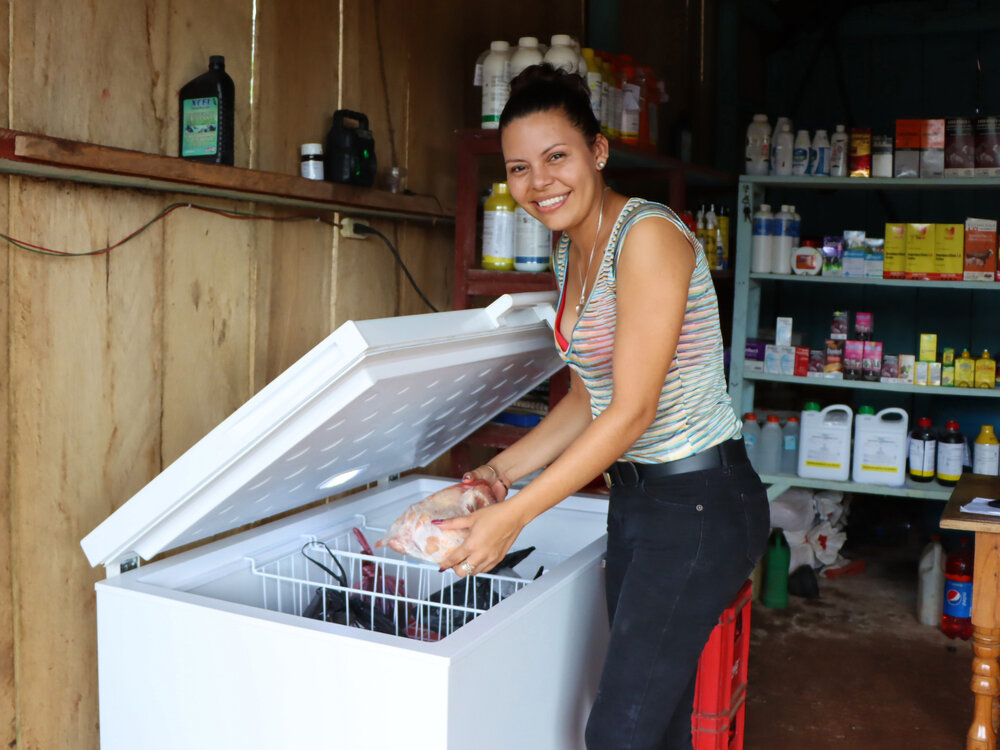CABEI-supported energy sector initiatives in Nicaragua contribute to economic, social, and environmental development

With the support of the multilateral, more than 5.3 million Nicaraguans in urban and rural areas will benefit.
Managua, 21 de Marzo de 2022.- Contributing to the reduction of poverty and social inequality in Nicaragua through access to electricity, the Central American Bank for Economic Integration (CABEI) is implementing a total of seven initiatives that contribute to the country's economic, social, and environmental development.
Through the implementation of these programs and projects, more than 5.3 million people in urban and rural areas have benefited from 24-hour, efficient, continuous, and quality electricity service.
"As CABEI, we are pleased to support initiatives that transform the lives of Nicaraguan families, because having energy service strengthens citizen security and boosts the activities of the commercial, industrial, health and education sectors, among others. It is also important to highlight our firm support for Nicaragua to achieve nationwide electricity coverage," said CABEI Executive President, Dr. Dante Mossi.
Currently, the amount allocated for the execution of energy initiatives amounts to US$540.23 million and among the main ones are: the National Program for Sustainable Electrification and Renewable Energy (PNESER TRAMO A, B and C), Program for the Sustainability of the Nicaraguan Electricity Sector, Program for the Expansion of the Nicaraguan Electricity Transmission System, Rehabilitation and Modernization of the Centroamérica and Santa Bárbara Hydroelectric Plants and Managua Central Substation, the last two of which have recently been 100% completed.
"The impact that these initiatives have had on improving the quality of life of families is a reality, in this sense we can highlight the PNESER TRAMO A and B whose scope at the end of 2021 resulted in the rural electrification of a total of 41,682 homes and the construction of 21,629 distribution networks in rural electrification projects nationwide," explained CABEI Nicaragua Country Chief Officer, Carlos De Castilla.
In 2021, the Central Electrical Transmission Substation was completed, which is expected to meet the growth in demand for electricity consumption and strengthen the distribution system in the city of Managua, as well as generate a positive impact on the productivity of businesses, companies, universities, hospitals, and public places for the benefit of 142,987 people who live and circulate in the central area of the capital.
CABEI supports the generation of reliable, renewable and clean energy for 25 more years in Nicaragua, with the rehabilitation and modernization of the Centroamérica and Santa Bárbara (now Carlos Fonseca) Hydroelectric Plants, whose works consisted of the modernization of their electromechanical equipment and control centers, incorporating state-of-the-art technology and a real-time monitoring system for the hydroelectric plants, which add 100 megawatts (MW) to the installed capacity of the annual energy generation of the National Interconnected System (SIN), which represents a guaranteed 12.5% of the generation with this renewable source.
For its part, Nicaragua plans to start implementing the Nicaraguan Electricity Transmission System Expansion Program in 2022, which will benefit 10,842 families and 2,545 new users, for a total of 56,902 inhabitants. In addition, it will guarantee a more efficient, regular, and reliable energy supply in the municipality of Bluefields and surrounding areas, as well as the installation of 68.15 kilometers of transmission lines, a new and an expanded substation, and the modernization of the National Load Dispatch Center (CNDC, for its acronym in Spanish).
In line with the above, this year the implementation of the National Program for Sustainable Electrification and Renewable Energy (PNESER TRAMO C) is planned, which will continue with the financing of components 1 and 2:
- Rural Electrification by Extension of Networks to expand the country's electricity coverage through the connection of 35,000 homes to the network in 1,278 rural communities nationwide.
- Normalization of electricity service in 79,050 homes in 402 urban settlements, reducing energy losses and improving the quality of life of the beneficiaries.
Also, in 2022, the multilateral began specialized studies for the identification and design of multiple initiatives that will enable the implementation of electromobility in the countries of the region as part of its institutional strategy and support for post-COVID-19 economic recovery, in order to improve the quality of life of the populations living in urban areas, considering the key sectors of low-emission transportation (electric mobility), energy, tourism and finance, among others.
In line with the above, as the Green Bank of Central America promotes initiatives such as the Electric Train in Costa Rica; specialized studies for the transition to low-emission transportation, such as the introduction of the AeroMetro and electric buses in Guatemala.
CABEI currently supports a total of 33 public sector programs and projects in Nicaragua, ranging from road and hospital infrastructure to energy, water, and sanitation, among others. Investments total US$1.586 billion and approvals total US$890.17 million.







